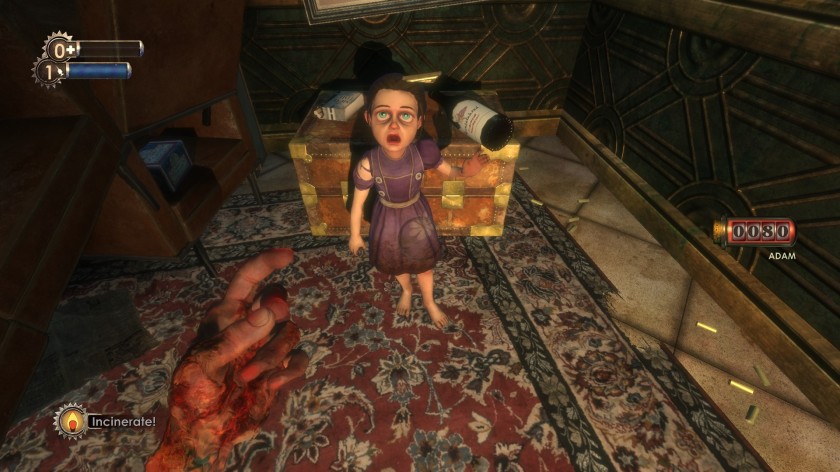
I often find myself pondering difficult questions.
“If time travel were possible, how catastrophic could it be?”
“What if warp travel allowed us to see the universe’s edge?”
“What would happen if someone founded a city-state based on a radical interpretation of Objectivism? What would the place look like if things went miserably, horribly wrong?”
I may not find all the answers I’m seeking in this lifetime, but I at least have BioShock to give me insight into that last question. The game’s creator Ken Levine either really dislikes Ayn Rand, is a genius at pointing out our silly pants, or both.
Prominent engineer Andrew Ryan envisions a society where man can achieve his greatest potential without government influence. He discovers the best place to secede from the world is miles beneath the sea. In the underwater city of Rapture, “the artist would not fear the censor [and] the scientist would not be bound by petty morality.” In this case, the artist has a special pose in mind if you disagree with his work, and the doctor, unrestrained by ethics, can rearrange a human body long after the blood is gone.
As for the scientists, the lack of any boundaries has led to discovering a cellular enhancer called Adam. The substance is shaped into ‘Plasmids,’ extraordinary physical and mental abilities that allow Rapturians to become the superhumans they deserve—provided they have the cash. In an uber-capitalist venture like Rapture, even the public park costs money.
Adam is grown in the stomachs of small girls, or “Little Sisters.” Since defenseless children are Adam’s prime source, they are paired with giant cyborg killing machines called Big Daddies.
Adam turns out to be more addictive than heroin laced sugar, and a massive addict (“Splicer”) surge breaks out just as Andrew Ryan goes power mad. Several dozen public executions later and Rapture has gone beyond Hell. Frozen pipes have burst, flooding large chambers with sea water. Splicers scream incoherent babble, ready to rush out with whatever weapons they’ve found. The Little Sisters, eyes glowing like embers, wander around with their single-minded Big Daddies lumbering behind. Rapture is a dystopia in the most extreme sense of failure, as beautiful to look at as it is awful to behold.
Enter Jack, who finds his way down to Rapture after surviving a plane crash. Jack falls into Rapture’s disturbing plight via radio by Atlas, who is trying to save his family from the still living and still crazed Andrew.
Lingering questions rise during the journey. Why am I helping Atlas? What is our mutual goal? Most importantly, what’s in it for me? I’m just a surface dweller who found this place after my flight went down. Why should I care about these people?
BioShock has a famous twist halfway through. I won’t spoil it here, but everything problematic about video game protagonists being blind mules receives a due explanation.
Meanwhile, Jack must contend with Splicers, security drones, gun turrets, environmental hazards and Big Daddies. Each deck being harder than the last, so Jack has no choice but to adapt using Adam. To get the Adam he has to corner the Little Sisters. To reach them he must first kill their Big Daddies, who are one-man massacres made up of heavy armor and brutal firepower.
Little Sisters are where the game’s moral ambiguity comes into play. Upon capturing a Little Sister, Jack can deal with her in two ways: ‘Harvesting,’ which kills her but gives him all the Adam she was carrying; or ‘Rescuing,’ where she survives but Jack receives half her Adam.
It comes down to patience vs. survival. By Rescuing Little Sisters you have less access to upgrades early on, but being a good boy and taking extra punishment a while begets useful rewards. Harvesting Little Sisters makes the game easier, but it paints you as a dick willing to murder children to meet ends. How threatened do you feel? Are the Little Sisters innocent children or souless husks?
In the grand scheme it doesn’t matter, as dying isn’t a big deal in BioShock. If you fall in battle you respawn nearby with all your weapons, ammo, money and magic meter intact. The enemies you were battling retain the same damage, so that Splicer or Big Daddy will still be bleeding or on fire. If necessary, you can blast away until you die, get up, and repeat the process until the opposing forces stop moving.
Furthermore, there are plenty of vending machines around to keep you healthy. If you’re short on cash there’s loot for the frequent explorer, and dead bodies almost always carry useful junk.
You can also ‘hack’ the vending machines by suffering through a Pipe Dream clone, and there are Plasmids to make the hacking minigame easier. Once you start gathering materials to craft items you can create ‘Autohacks,’ which render tinkering the hard way an unnecessary endevor.
Although death bears zero consequences, I did find a challenge within, namely how long I could stay alive before the next RPG cooked my bone marrow. There is a certain shame in dying. Sure, it costs nothing but I feel incompetent when it happens. If I’m rushing blind into a hail of gunfire, mortality be damned, I’m exploiting a loophole, not playing the ‘right’ way.
BioShock is a first-person shooter armored with flair and thought. In a genre where aliens, demons, zombies and Nazis are tired staples, strung out Libertarian armies are a unique take on an established medium. A whole theme centered around making fun of The Fountainhead could have been a throwaway gimmick, but it works. Rapture provides a balanced blend of bleak horror and comic satire, the kind sparked when a smart person puts in the extra effort.
I’ll be coming back to rake up Achievements.
FINAL GRADE: B-
